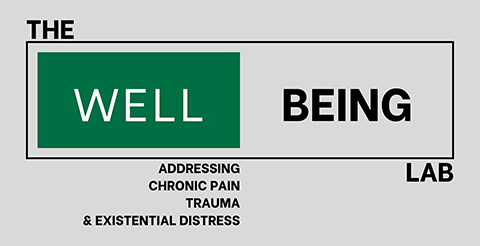Leadership:
Main Challenge
Chronic pain and co-occurring mental health conditions is a significant problem in the U.S., often coinciding with existential distress (distress related to the limitations of human existence, such as loss of meaning in life and death anxiety). Therefore, a whole person approach to care is needed. However, such interventions are not always available.
Our Approach
- We aim to develop and test non-pharmacologic interventions, particularly mind-body interventions, that both reduce symptoms and improve well-being.
- We strive to take a “systems approach” to our research, where we work with clinics to improve how care is delivered to ensure maximize impact.
- The Well-Being Lab has 5 Core Values
- Purpose: Our lab’s work is driven by the purpose to improve health and well-being through whole person care.
- Impact: We strive to maximize our impact by working directly with healthcare systems where care is delivered.
- Innovation: We push boundaries in our lab, stretching the imagination in hopes for scientific breakthroughs.
- Rigor: While we engage with purpose to maximize impact and innovation, we do so using rigorous scientific methods.
- Equity and Inclusion: Our lab thrives by welcoming diverse perspectives and diverse backgrounds. We strive to ensure the communities we serve our represented in our research, and we strive to ensure care is delivered to underserved communities.
Contact
David E Reed, II
Director
davider2@uw.edu

